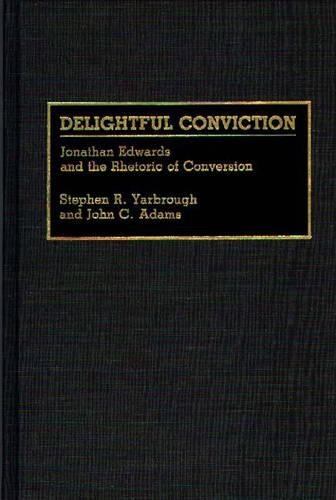
Delightful Conviction: Jonathan Edwards and the Rhetoric of Conversion
(Hardback)
Publishing Details
Delightful Conviction: Jonathan Edwards and the Rhetoric of Conversion
By (Author) John C. Adams
By (author) Stephen R. Yarbrough
Bloomsbury Publishing PLC
Greenwood Press
3rd February 1993
United States
Classifications
Tertiary Education
Non Fiction
Christianity
Theology
285.8092
Physical Properties
Hardback
208
Description
In analyzing Jonathan Edwards preaching in eighteenth-century colonial America, the authors demonstrate how his rhetoric distinguished between conversion and persuasion. The authors delineate the basic tenets of Puritan theology, place Edwards' noted sermons within an historical framework, and show how his psycho-spiritual ideas have had lasting impact on American literary, religious, and intellectual history. This reference provides a critical analysis, speech texts, chronology, and bibliography. Students and teachers of rhetoric, American history, literature, philosophy, and religion will find this in-depth study of an enigmatic great American orator pertinent for various uses. The reference defines Edwards' doctrinal stance on key religious issues of the times, describes his methods of preaching and efforts to convert sinners into saints, and assesses his influence in the eighteenth century and later. The volume covers his life, his youth and education, his revival and role in the Great Awakening of religion in America, his church's rejection and his exile. This scholarly study relates his ideas to complex theological roots in European thought, to Christian and Enlightenment discourses, and it points to the enormous effect that he has had on thinking until the twentieth century. Texts of key sermons dealing with central concepts such as divine light, sinners, and true grace are provided.
Reviews
Delightful Conviction succeeds where less in-depth works have failed; that is, while exploring the rich heritage of Edwardsean legacy, the authors have also found a way to make their study more than a history lesson. Their analysis of Edward's rhetorical practice provides insights into the discourse of a past age. Their theoretical discussions, particularly the link with postmodernity, may help to inform discourse in the age to come.-Quarterly Journal of Speech
"Delightful Conviction succeeds where less in-depth works have failed; that is, while exploring the rich heritage of Edwardsean legacy, the authors have also found a way to make their study more than a history lesson. Their analysis of Edward's rhetorical practice provides insights into the discourse of a past age. Their theoretical discussions, particularly the link with postmodernity, may help to inform discourse in the age to come."-Quarterly Journal of Speech
Author Bio
STEPHEN R. YARBROUGH, Associate Professor of English, Skidmore College, has written at length on critical theory and American literature. JOHN C. ADAMS, Associate Professor of the Department of Speech Communication, Syracuse University, has written many articles for professional journals on American rhetoric and the history of public address.
